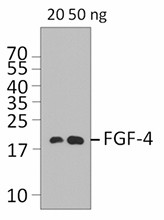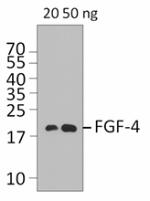- Clone
- 2D1C57 (See other available formats)
- Regulatory Status
- RUO
- Other Names
- Fibroslast Growth Factor 4 (FGF-4), Heparin-Binding Growth Factor 4 (HBGF-4), HST-1, K-FGF, KS3, Kaposi Sacrcoma Oncogene, Heparin Secretory Transforming Protein 1 (HSTF-1), FGF4, HBGF4, HST1, HSTF1
- Isotype
- Mouse IgG2a, κ
- Ave. Rating
- Submit a Review
- Product Citations
- publications

-

20 or 50 ng of human FGF-4 recombinant protein was resolved by electrophoresis, transferred to nitrocellulose, and probed with purified monoclonal anti-FGF-4 (clone 2D1C57) antibody. Proteins were visualized using a HRP conjugated anti-mouse-IgG secondary and chemiluminescence detection.
| Cat # | Size | Price | Quantity Check Availability | Save | ||
|---|---|---|---|---|---|---|
| 677402 | 100 µg | 184€ | ||||
FGF-4 was first identified as HST-1 gene by a NIH3T3 transforming assay. It belongs to the FGF family that includes 22 members (FGF1-FGF23). However, FGF15 has not been identified in humans. FGF-4 exhibits strong effects on many different cell types and tissues, and plays an important role in both embryogenesis and adult tissue stem cell development in a variety of organisms. FGF-4 can stimulate limb mesenchyme proliferation and can provide all the signals required for normal outgrowth and patterning of the limb. FGF-4 mRNA has been detected in the apical ectodermal ridge of the limb bud in day 11 and 12 embryos. FGF-4 is also involved in early heart development by supporting the proliferation and differentiation of precardiac myoblasts. In adults, FGF-4 is expressed in the testis and its overexpression results in enhanced spermatogenesis. FGF-4 is also a potent inducer of platelet production from megakaryocytes. FGF-4 expression has been detected in the brain at both neonatal and adult stages. FGF-4 can induce neural stem cell proliferation and neuronal differentiation. The diverse functions of FGF-4 are mediated by FGF receptors (FGFR) that contain an extracellular ligand-binding domain with three immunoglobulin-like domains. Like other FGFs, FGF-4 also binds to anionic glycosaminoglycans heparin and heparin sulfate with a high affinity. Heparin sulfate availability has been shown to regulate the binding between FGF-4 and its receptors. The role of FGF-4 in cancer has also been extensively investigated. FGF-4 is an angiogenic protein, and the amplification of FGF-4 gene has been found in many human tumors. It has been shown that FGF-4 is a potential target for the treatment of human testicular tumors.
Product DetailsProduct Details
- Verified Reactivity
- Human
- Antibody Type
- Monoclonal
- Host Species
- Mouse
- Immunogen
- Partial human FGF-4 recombinant protein (54-206 a.a.) expressed in E. coli.
- Formulation
- Phosphate-buffered solution, pH 7.2, containing 0.09% sodium azide.
- Preparation
- The antibody was purified by affinity chromatography.
- Concentration
- 0.5 mg/ml
- Storage & Handling
- The antibody solution should be stored undiluted between 2°C and 8°C.
- Application
-
WB - Quality tested
- Recommended Usage
-
Each lot of this antibody is quality control tested by Western blotting. For Western blotting, the suggested use of this reagent is 0.25 - 1.0 µg per ml. It is recommended that the reagent be titrated for optimal performance for each application.
- RRID
-
AB_2565907 (BioLegend Cat. No. 677402)
Antigen Details
- Structure
- The 153 amino acid recombinant protein has a predicted molecular mass of approximately 19.7 kD. Growth factor.
- Distribution
- Secreted. Expression of FGF-4 is highly restricted to undifferentiated stem cells.
- Function
- FGF-4 is a mitogenic, angiogenic, and survival factor. It is involved in cell proliferation and differentiation in embryonic development processes. N-glycosylation may negatively regulate FGF-4 activity.
- Interaction
- Precardiac myoblasts, megacariocytes, and neural stem cells.
- Ligand/Receptor
- FGFR-I, IIIc; FGFR-2, IIIc; FGFR-3, IIIc, and FGFR-4.
- Biology Area
- Cell Biology, Neuroscience, Synaptic Biology
- Molecular Family
- Adhesion Molecules, Growth Factors
- Antigen References
-
1. Konishi H, et al. 1996. Oncogene 13:9.
2. Sun X, et al. 2000. Nat. Genet. 25:83.
3. Yamamoto H, et al. 2002. Oncogene 21:899.
4. Kosaka N, et al. 2006. FASEB J. 20:1484.
5. Kosaka N, et al. 2009. Dev. Dyn. 238:265.
6. Arao T, et al. 2013. Hepatology 57:1407.
7. Itoh N, Ohta H. 2013. Front Physiol. 4:247. - Gene ID
- 2249 View all products for this Gene ID
- UniProt
- View information about FGF-4 on UniProt.org
Related Pages & Pathways
Pages
Related FAQs
Other Formats
View All FGF-4 Reagents Request Custom Conjugation| Description | Clone | Applications |
|---|---|---|
| Purified anti-FGF-4 | 2D1C57 | WB |
Compare Data Across All Formats
This data display is provided for general comparisons between formats.
Your actual data may vary due to variations in samples, target cells, instruments and their settings, staining conditions, and other factors.
If you need assistance with selecting the best format contact our expert technical support team.
-
Purified anti-FGF-4

20 or 50 ng of human FGF-4 recombinant protein was resolved ...
 Login / Register
Login / Register 







Follow Us